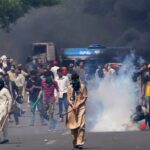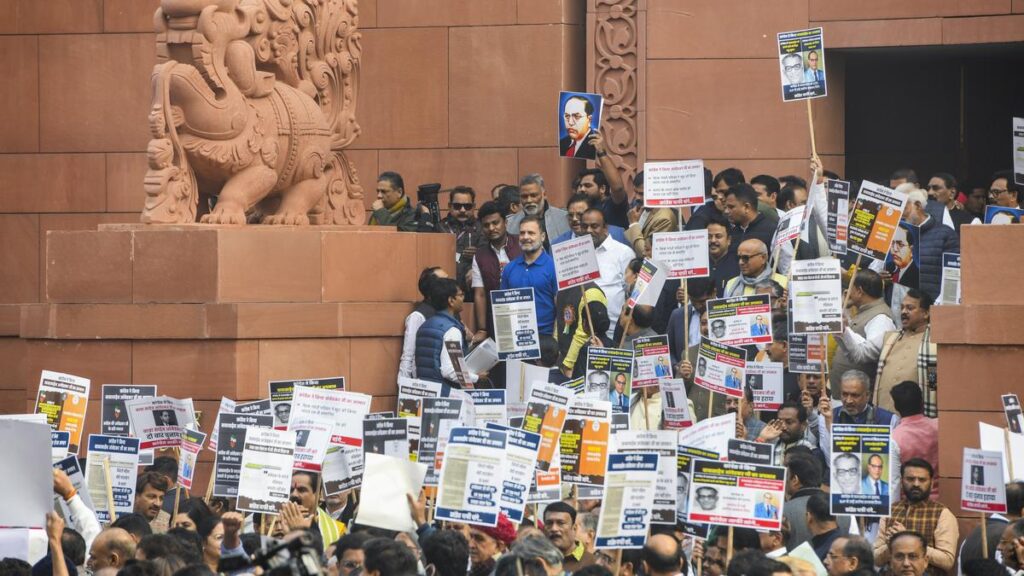
Denying the Bharatiya Janata Party (BJP) a majority was the highlight of the Opposition this year as Prime Minister Narendra Modi got re-elected for a historic third term. Apart from this, the Opposition faced arrest of two sitting CMs, lose a state government, loss in two state elections and wins in two, original parties losing their credentials and heated Parliament sessions.
Through the year, the Opposition was divided on Ram Temple inaugural, united on the Lok Sabha campaign with Rahul Gandhi’s Bharat Jodo Nyay Yatra and divided yet again on the Rajya Sabha and state elections. The Opposition coalition – Indian National Developmental Inclusive Alliance (INDIA) rallied around Arvind Kejriwal and Hemant Soren after their arrests in January and March respectively and backed Sharad Pawar and Uddhav Thackeray’s efforts to stake claim to their parties Nationalist Congress Party (NCP) and Shiv Sena, but fought Haryana and Jammu-Kashmir polls separately before uniting for Maharashtra and Jharkhand.
Lately, with Congress’ increased doubts on the Electronic Voting Machines (EVM), several INDIA bloc members have questioned the party’s ability to lead the coalition.
Here’s a look at the Opposition’s journey in 2024
Ram Mandir’s consecration
Kicking off a storm, the Opposition appeared split in attending the Ram Mandir temple’s ‘Pran Prathishtha’ (consecration) on January 30. With Mr. Modi presiding over the ceremony, parties like Shiv Sena (UBT), Aam Aadmi Party, some Congress leaders, expressed their wish to attend the event and grumbled at the lack of invitation.
Prime Minister Narendra Modi and RSS chief Mohan Bhagwat offer prayers before the idol of Ram Lalla during the ‘Pran Pratishtha’ ceremony at the Ram Mandir in Ayodhya on January 22, 2024
| Photo Credit:
PTI
TMC chief Mamata Banerjee, SP chief Akhilesh Yadav, RJD chief Lalu Yadav and CPI(M) General Secretary Sitaram Yechury said that they would not be attending. Congress chief Mallikarjun Kharge and his predecessor Sonia Gandhi too turned down the invite, accusing BJP of making a religious event into a political campaign. Similar accusations were made by Shiv Sena (UBT) leader Sanjay Raut who said, “Now, the only thing left is that the BJP will announce that Lord Ram will be their candidate for the elections”. Several Congress leaders like Sukhvinder Singh Sukhu, Vikramaditya Singh, Arjun Modhwadia differed from the Congress top brass’ decision.
Bharat Jodo Nyay Yatra
Kicking off the second leg of his pan-India tour, Congress leader Rahul Gandhi commenced the Bharat Jodo Nyay Yatra from Manipur on January 14. Covering 14 states and 6300 km, the Yatra began from the strife-hit Thoubal in Manipur and ended in the country’s financial capital – Mumbai. While the Yatra boosted Mr. Gandhi and the Congress’ connect with the locals, it was marred by disapproval of several Opposition parties.
Highlighting the Congress’ indifference towards building a joint campaign against the BJP for the Lok Sabha polls, Ms. Banerjee refused to cede any seats to Congress in West Bengal. As the Yatra entered Bihar, Janata Dal United (JDU) severed ties with INDIA and rejoined the BJP-led National Democratic Alliance (NDA). Even at the tailender, Milind Deora ended his family’s 55-year-old ties with the party to join the Shiv Sena in the presence of Chief Minister Eknath Shinde.

Congress leader Rahul Gandhi waves to supporter during the Bharat Jodo Nyay Yatra from Raigarh on February 11, 2024. Photo: AICC via ANI
Through the journey, Mr. Gandhi floated several poll promises (the five nyays and 25 guarantees) – legal backing for Minimum Support Price, caste census, mandatory internship for job-seeking youth, ₹1 lakh per annum to women and an urban version of MGNREGA. Brushing off its allies’ criticism, Congress claimed that the Yatra saw an intermingling of cadres from other parties such as Samajwadi Party, NCP and Left. The Yatra segued neatly into the Congress’ Lok Sabha campaign which kicked off in late March.
Arrest, party loss and Rajya Sabha
Amid the Yatra, Congress’ allies faced major upheavals in their campaign – arrest of Jharkhand CM Hemant Soren and Delhi CM Arvind Kejriwal, Maharashtra Speaker declaring faction led by Mr. Shinde as the ‘real’ Shiv Sena, Election Commission of India (ECI) recognising Ajit Pawar’s faction as the Nationalist Congress Party (NCP) and cross-voting in Rajya Sabha polls.
On January 31, the Enforcement Directorate (ED) arrested Hemant Soren in a land scam case soon after he resigned as Jharkhand Chief Minister. Handing over the reins to Jharkhand Mukti Morcha’s (JMM) five-time Saraikela MLA Champai Soren, Mr. Soren maintained his innocence claiming that the seizures and raids from his New Delhi residence. After five months of incarceration, Mr. Soren walked out of jail on June 28 after the Jharkhand High Court granted him bail. Immediately, the other Soren was made to resign and Mr. Soren took oath again as CM.
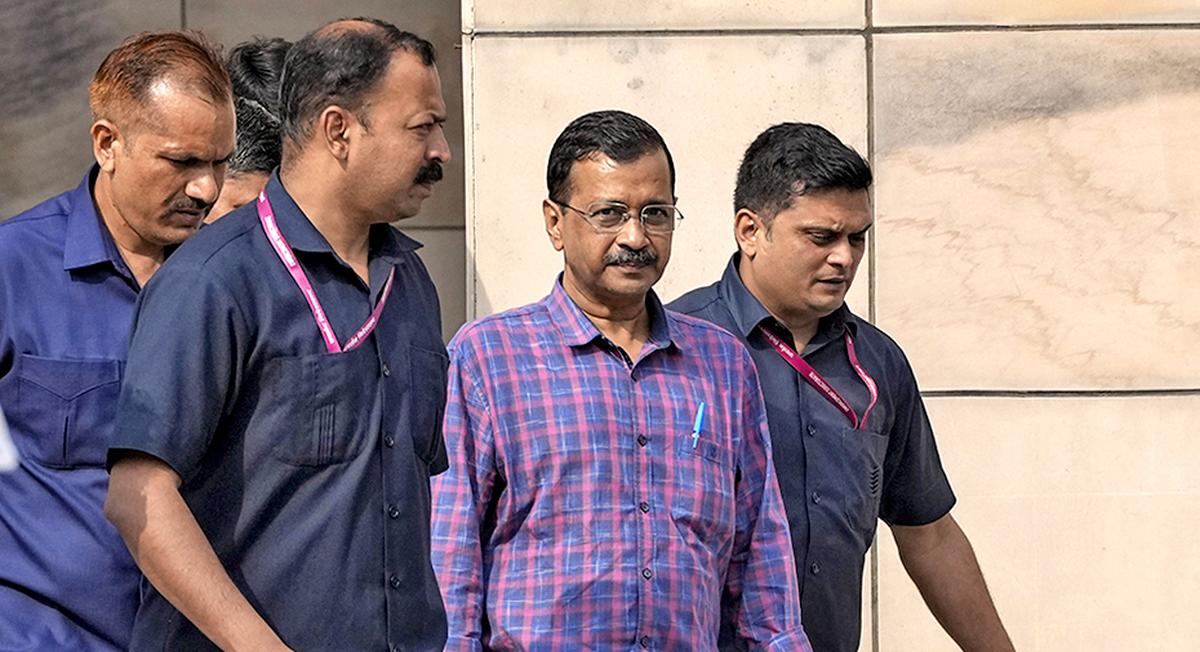
Delhi Chief Minister and AAP convenor Arvind Kejriwal is excorted out of the Rouse Avenue Court on March 28, 2024 after his appearance in the excise policy-linked money laundering case.
| Photo Credit:
PTI
In a similar fashion, the ED arrested Delhi CM Arvind Kejriwal on March 21 in the Delhi excise money laundering case, after the Supreme Court refused to grant him relief. Unlike Mr. Soren, Mr. Kejriwal refused to step down from his post. He was granted interim bail on May 10 and he spearheaded AAP’s Lok Sabha campaign. After he surrendered to jail on June 2, he was granted regular bail in September under the condition that he will not visit CM’s office or sign any official files. On walking out of Tihar jail, he stepped down as CM, appointing Atishi in his place.
In Maharashtra, Speaker Rahul Narwekar, on January 10, ruled that the Eknath Shinde-led faction was the ‘real’ Shiv Sena. He further refused to disqualify the 30 Shiv Sena MLAs who rebelled against the undivided party in July 2022, citing lack of valid grounds. Mr. Shinde’s faction had already won the EC’s recognition as the Shiv Sena along with its iconic ‘bow and arrow’ electoral symbol. The Speaker’s verdict has now been challenged by Uddhav Thackeray in the Supreme Court.
A month later, on February 6, the EC ruled that the faction led by Sharad Pawar’s nephew Ajit Pawar is the real NCP and is entitled to use its name and reserved ‘clock’ symbol. The rebel Pawar had walked away with 40 of of NCP’s 53 MLAs to join the Mahayuti (BJP-Shiv Sena) government in July 2023. This decision has also been challenged by Sharad Pawar in the SC.
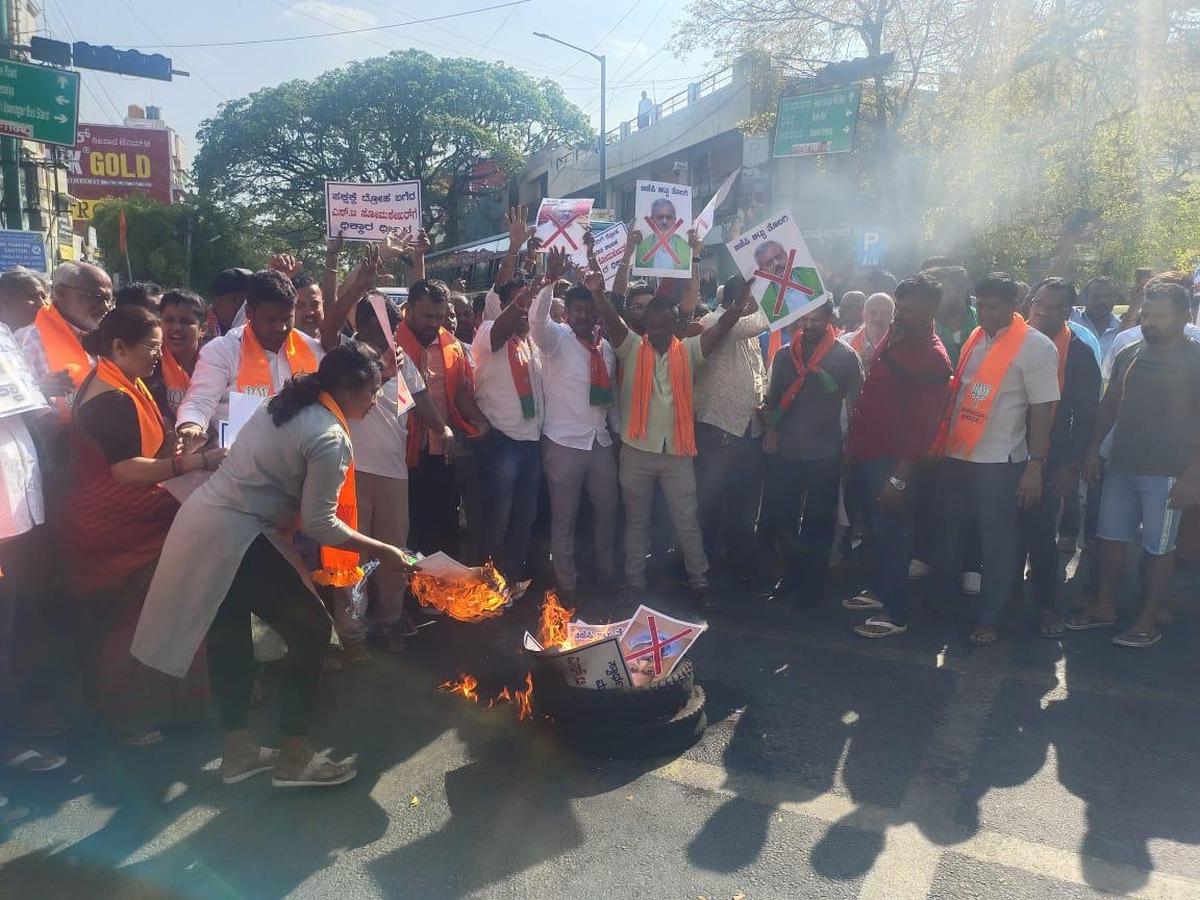
BJP workers in Bengaluru on February 27, 2024 protest against Yeshavantpur MLA S.T. Somasekhar, who has cross-voted in the Rajya Sabha elections.
| Photo Credit:
The Hindu
Cross-voting spoilt a crucial poll to fifteen Rajya Sabha seats where BJP won two seats more than expected. Inspite of a Congress majority in the Himachal Pradesh Assembly, BJP’s Harsh Mahajan defeated Congress stalwart Abhishek Manu Singhvi, setting the stage for a no-trust motion in the Assembly. In Uttar Pradesh, BJP won eight seats out of 10, one more than it was expected to win. In Karnataka, Congress bagged three while BJP took the remaining one seat – strictly on party lines.
Lok Sabha polls
Spread across seven phases from April to June, the BJP launched an ambitious re-election campaign setting aim for 400+ seats in the 543-member Lok Sabha. The number of seats going to polls steadily reduced as the phases proceeded – 101, 88, 94, 96, 49, 58 and 57. Results, announced on June 3, awarding Mr. Modi a third term albiet with a reduced majority. The BJP won 240 seats (36.56% votes), followed by Congress with 99 seats (21.19% votes), Samajwadi Party with 37 seats (4.58%), TMC with 29 seats (4.37%) and DMK with 22 seats (1.82%). With the support of its allies – TDP (16 seats), JD(U) (12 seats), Shiv Sena (7 seats), Lok Janashakti Party (Ram Vilas) (5 seats) and others, the NDA government was sworn in June 9.
Spearheading the campaign, Prime Minister Narendra Modi went hard on his anti-minority rheotric while accusing Congress of appeasement, which alienated the religious minorities — Muslims, Christians, and Sikhs, found the Lokniti CSDS post-poll survey. Even the 31% of Dalit votes recieved by BJP was marred by its ‘400+’ campaign which stoked fears among the communities that BJP seeks to change the Constitution. However, BJP’s nurtured vote base – upper caste Hindus, OBCs, Adivasis and some Dalits remained with it, impressed by its delivery of welfare schemes.
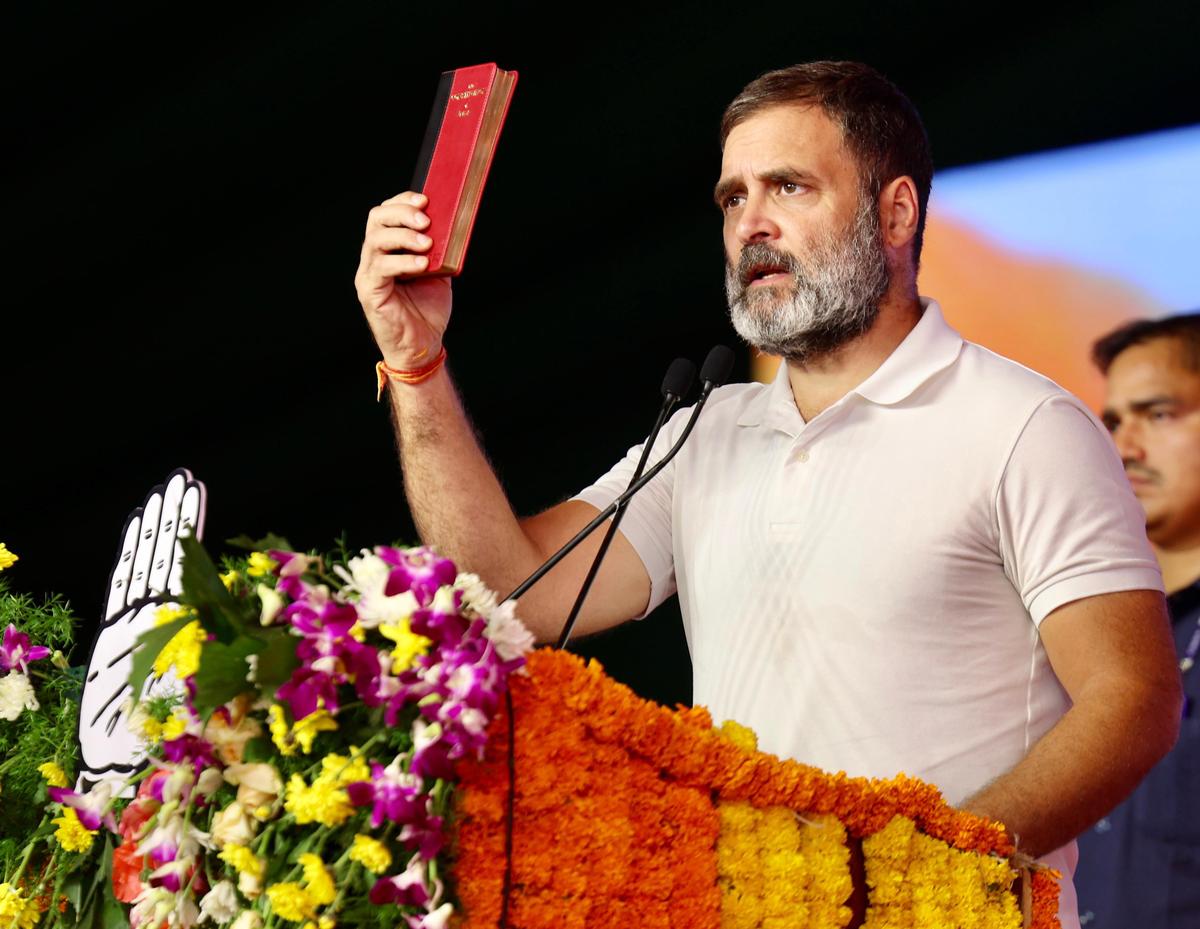
Congress leader Rahul Gandhi displays a copy of the Constitution of India during a public meeting in Nagarkurnool on May 5, 2024. Photo: X/@INCIndia via ANI
The Opposition’s campaign centred around its fight to protect the Constitution and democracy. Taking a backseat, Congress contested on 328 seats, its fewest ever, conceding to regional satraps like SP, RJD, NC, JMM etc. Its gamble worked as the BJP was unable to stop the TMC in West Bengal which won 29 of the 42 seats with a 10% increase in its women’s votes. In Haryana, Congress’ smart maneuvering of Deepender Hooda and Kumari Selja as leaders and its protests against Agniveer scheme, agrarian distress helped it clinch 5 out of 10 seats.
In Maharashtra, its broad coalition with Shiv Sena (UBT) and NCP, helped it win 30 of the 48 seats. In Uttar Pradesh, by ceding ground to SP, INDIA was able to limit BJP to mere 35 seats and ensuring a loss in Faizabad, where the new Ram Mandir stands. Rahul Gandhi’s Yatra too saw a positive effect in the polls. According to an analysis, of the 71 Lok Sabha constituencies it passed through, Congress contested 56 seats and won 23.
State polls
Riding high on its Lok Sabha performance, the Congress campaigned on similar issues — caste census, jobs, social justice, increase in reservation, cash transfers to women, youth, farmers — in Jammu & Kashmir, Haryana, Maharashtra and Jharkhand Assembly polls. Its strong coalition with National Conference (NC) in J&K and JMM in Jharkhand, helped the Congress clinch the State elections. However in Haryana and Maharashtra, the BJP’s strong groundwork with its ideological parent Rashtriya Swayamsevak Sangh (RSS) trumped the Congress and its allies.
After three-phase elections spanning from September 18 to October 6, Jammu & Kashmir awarded NC 42 seats and its ally, the Congress, six, while the BJP won 29. With seven independent candidates winning, the PDP — which refused to ally with Congress and NC — finished a distant fifth with a mere three seats. However, in Haryana, which went to polls on October 5, saw BJP retain the state for a third time. Congress’ campaign promoting Jat wrestlers, farmers and opposing agniveer recruitment failed as BJP successfully consolidated all non-Jat votes, winning 48 seats in the 90-member Assembly.
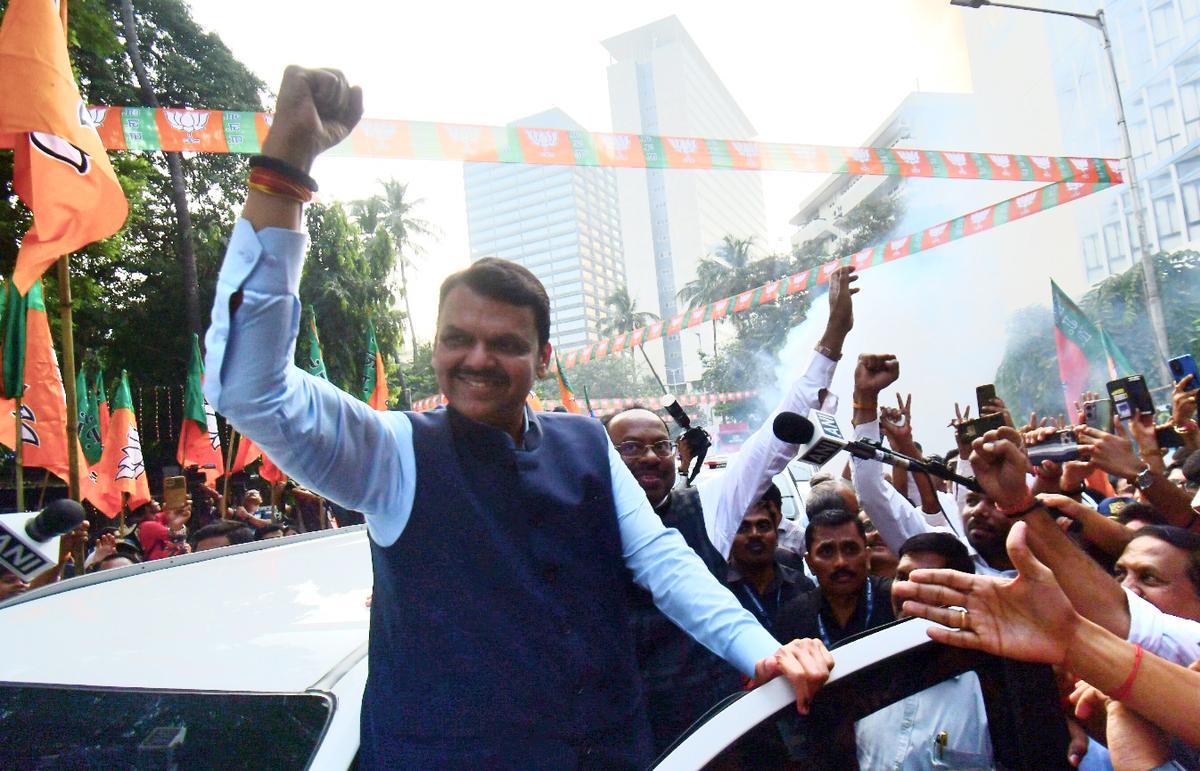
Maharashtra Deputy Chief Minister Devendra Fadnavis and supporters celebrate the BJP alliance’s victory in the Maharashtra Assembly elections.
| Photo Credit:
The Hindu
In November, the JMM-Congress duo retained the State ushering in Hemant Soren’s fourth term. Inspite of engineering several high-profile switching of JMM veterans including ex-CM Mr. Champai Soren, BJP failed to make an impact winning only 24 of the 81 seats. However, in Maharashtra, the Mahayuti (BJP, NCP and Shiv Sena) smarted from its Lok Sabha drubbing and launched its flagship ‘Ladki Bahin’ scheme giving a monthly dole out of ₹1,500 to women. This helped it win a massive mandate clinching 233 seats (BJP 132 seats, Shiv Sena 57 seats and NCP 41 seats), ushering in Devendra Fadnavis’ third term. All three Maha Vikas Aghadi parties have questioned the results, blaming the EC of bias.
Stormy Parliament sessions
The monsoon session, which marked the return of the Opposition in a strong position, saw the election of Mr. Gandhi as Leader of Opposition and re-election of Om Birla as Speaker and the continued vacancy of Deputy Speaker. Of the 14 bills introduced in Parliament, only four were passed by the Lok Sabha and three by the Rajya Sabha. These include the Union Budget and the J&K budget presented by the Centre. Walkouts, protests and early adjournments dotted the monsoon session, including a rare walkout by Rajya Sabha Chairman Jagdeep Dhankar who was upset at Opposition’s challenge to his decision disallowing a discussion wrestler Vinesh Phogat’s disqualification from the Olympic Games.
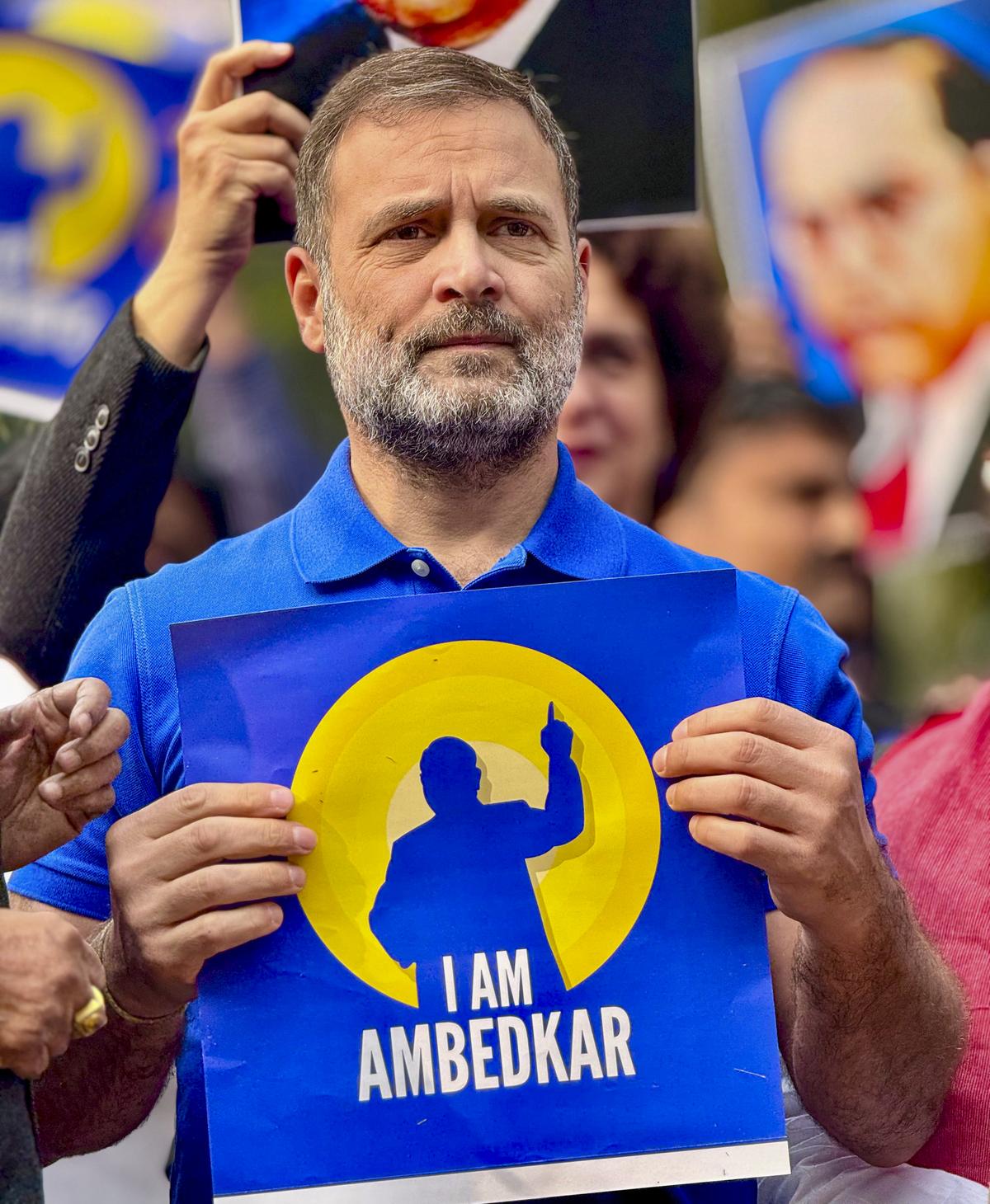
Leader of the Opposition in the Lok Sabha Rahul Gandhi during a protest by the INDIA bloc in Parliament premises on December 19, 2024.
| Photo Credit:
PTI
The Winter session was frostier as the first week saw repeated early adjournments as Opposition continued to target the Adani group over its indictment in the U.S. on bribery charges. Faced with a strong opposition over the Waqf (Amendment) Bill, 2024, the Centre recommended it to a joint parliementary committee (JPC). Similarly, upon its introduction itself, Centre also referred the ‘One Nation, One Election’ bills to a JPC. During a scheduled debate on seventy-five years of Constitution, the Opposition rose in unison demanding Union Home Minister Amit Shah’s apology and resignation over his remarks over Dr. B. R. Ambedkar. The session also saw the election of Priyanka Gandhi Vadra to the Lok Sabha via Wayanad bypolls, making it a first when three Gandhis were in Parliament.
Published – December 26, 2024 09:45 pm IST
इसे शेयर करें:



